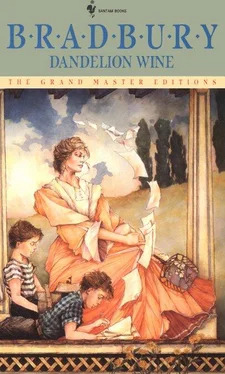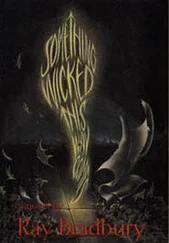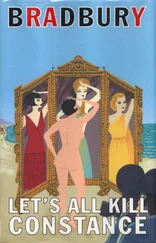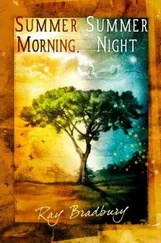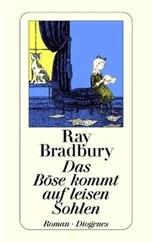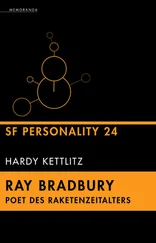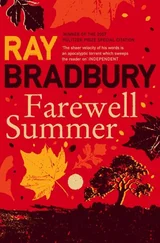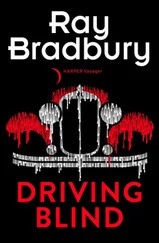“He looks dead,” whispered Douglas.
“No, he’s just thinking up new places to travel to,” said Charlie, very proud and quiet. “Colonel?”
One of the pieces of brown furniture moved and it was the colonel, blinking around, focusing, and smiling a wild and toothless smile. “Charlie!”
“Colonel, Doug and John here came to—”
“Welcome, boys; sit down, sit down!”
The boys sat, uneasily, on the floor.
“But where’s the—” said Douglas. Charlie jabbed his ribs quickly.
“Where’s the what?” asked Colonel Freeleigh.
“Where’s the point in us talking, he means.” Charlie grimaced at Douglas, then smiled at the old man. “We got nothing to say. Colonel, you say something.”
“Beware, Charlie, old men only lie in wait for people to’ ask them to talk. Then they rattle on like a rusty elevator wheezing up a shaft.”
“Ching Ling Soo,” suggested Charlie casually.
“Eh?” said the colonel.
“Boston,” Charlie prompted, “1910.”
“Boston, 1910 . . .” The colonel frowned. “Why, Ching Ling Soo, of course!” “Yes, sir, Colonel.”
“Let me see, now . . .” The colonel’s voice murmured, it drifted away on serene lake waters. “Let me see . . .”
The boys waited.
Colonel Freeleigh closed his eyes.
“October first, 1910, a calm cool fine autumn night, the Boston Variety Theatre, yes, there it is. Full house, all waiting. Orchestra, fanfare, curtain! Ching Ling Soo, the great Oriental Magician! There he is, on stage! And there I am, front row center! ‘The Bullet Trick!’ he cries. ‘Volunteers!’ The man next to me goes up. ‘Examine the rifle!’ says Ching. ‘Mark the bullet!’ says he. ‘Now fire this marked bullet from this rifle, using my face for a target, and,’ says Ching, ‘at the far end of the stage I will catch the bullet in my teeth!’”
Colonel Freeleigh took a deep breath and paused.
Douglas was staring at him, half puzzled, half in awe. John Huff and Charlie were completely lost. Now the old man went on, his head and body frozen, only his lips moving.
“‘Ready, aim, fire!’ cries Ching Ling Soo. Bang! The rifle cracks. Bang! Ching Ling Soo shrieks, he staggers, he falls, his face all red. Pandemonium. Audience on its feet. Something wrong with the rifle. ‘Dead,’ someone says. And they’re right. Dead. Horrible, horrible . . . I’ll always remember . . . his face a mask of red, the curtain coming down fast and the women weeping . . .1910 . . . Boston . . . Variety Theatre . . . poor man . . .
Colonel Freeleigh slowly opened his eyes.
“Boy, Colonel,” said Charlie, “that was fine. Now how about Pawnee Bill?”
“Pawnee Bill . . . ?”
“And the time you was on the prairie way back in ’75.”
“Pawnee Bill . . .” The colonel moved into darkness. “Eighteen seventy-five . . .yes, me and Pawnee Bill on a little rise in the middle of the prairie, waiting. ‘Shh!’ says Pawnee Bill. ‘Listen.’ The prairie like a big stage all set for the storm to come. Thunder. Soft. Thunder again. Not so soft. And across that prairie as far as the eye could see this big ominous yellow-dark cloud full of black lightning, somehow sunk to earth, fifty miles wide, fifty miles long, a mile high, and no more than an inch off the ground. ‘Lord!’ I cried, ‘Lord!’—from up on my hill—‘lord!’ the earth pounded like a mad heart, boys, a heart gone to panic. My bones shook fit to break. The earth shook: rat-a-tat rat-a-tat, boom! Rumble. That’s a rare word: rumble. Oh, how that mighty storm rumbled along down, up, and over the rises, and all you could see was the cloud and nothing inside. ‘That’s them!’ cried Pawnee Bill. And the cloud was dust! Not vapors or rain, no, but prairie dust flung up from the tinder-dry grass like fine corn meal, like pollen all blazed with sunlight now, for the sun had come out. I shouted again! Why? Because in all that hell-fire filtering dust now a veil moved aside and I saw them, I swear it! The grand army of the ancient prairie: the bison, the buffalo!”
The colonel let the silence build, then broke it again.
“Heads like giant Negroes’ fists, bodies like locomotives! Twenty, fifty, two hundred thousand iron missiles shot out of the west, gone off the track and flailing cinders, their eyes like blazing coals, rumbling toward oblivion!
“I saw that the dust rose up and for a little while showed me that sea of humps, of dolloping manes, black shaggy waves rising, falling . . .‘Shoot!’ says Pawnee Bill. ‘Shoot!’ And I cock and aim. ‘Shoot’ he says. And I stand there feeling like God’s right hand, looking at the great vision of strength and violence going by, going by, midnight at noon, like a glinty funeral train all black and long and sad and forever and you don’t fire at a funeral train, now do you, boys? do you? All I wanted then was for the dust to sink again and cover the black shapes of doom which pummeled and jostled on in great burdensome commotions. And, boys, the dust came down. The cloud hid the million feet that were drumming up the thunder and dusting out the storm. I heard Pawnee Bill curse and hit my arm. But I was glad I hadn’t touched that cloud or the power within that cloud with so much as a pellet of lead. I just wanted to stand watching time bundle by in great trundlings all hid by the storm the bison made and carried with them toward eternity.
“An hour, three hours, six, it took for the storm to pass on away over the horizon toward less kind men than me. Pawnee Bill was gone, I stood alone, stone deaf. I walked all numb through a town a hundred miles south and heard not the voices of men and was satisfied not to hear. For a little while I wanted to remember the thunder. I hear it still, on summer afternoons like this when the rain shapes over the lake; a fearsome, wondrous sound . . .one I wish you might have heard . . .”
The dim light filtered through Colonel Freeleigh’s nose which was large and like white porcelain which cupped a very thin and tepid orange tea indeed.
“Is he asleep?” asked Douglas at last.
“No,” said Charlie. “Just recharging his batteries.”
Colonel Freeleigh breathed swiftly, softly, as if he’d run a long way. At last he opened his eyes.
“Yes, sir” said Charlie, in admiration.
“Hello Charlie.” The colonel smiled at the boys puzzledly.
“That’s Doug and that’s John,” said Charlie.
“How-de-do, boys.”
The boys said hello.
“But—” said Douglas. “Where is the—?”
“My gosh, you’re dumb!” Charlie jabbed Douglas in the arm. He turned to the colonel. “You were saying, sir?”
“Was I?” murmured the old man.
“The Civil War,” suggested John Huff quietly. “Does he remember that?”
“Do I remember?” said the colonel. “Oh, I do, I do!” His voice trembled as he shut up his eyes again. “Everything! Except . . .which side I fought on . . .”
“The color of your uniform—” Charlie began.
“Colors begin to run on you,” whispered the colonel. “it’s gotten hazy. I see soldiers with me, but a long time ago 1 stopped seeing color in their coats or caps. I was born in Illinois, raised in Virginia, married in New York, built a house in Tennessee and now, very late, here I am, good Lord, back in Green Town. So you see why the colors run and blend . . .”
“But you remember which side of hills you fought on?” Charlie did not raise his voice. “Did the sun rise on your left or right? Did you march toward Canada or Mexico?”
“Seems some mornings the sun rose on my good right hand, some mornings over my left shoulder. We marched all directions. It’s most seventy years since. You forget suns and mornings that long past.”
Читать дальше
